At the Aspen Institute Economic Opportunities Program, and for our many colleagues and partners, the ongoing and intertwined health, economic, and racial justice crises bring new urgency to our work to improve access to quality jobs, opportunities to participate in business ownership, and the freedom to pursue economic mobility. Below we share our June newsletter with highlights of recent work. As always, we welcome your feedback, thoughts, and partnership in advancing inclusive opportunity and an economy in which we all can thrive. Click here to subscribe.
News and Updates
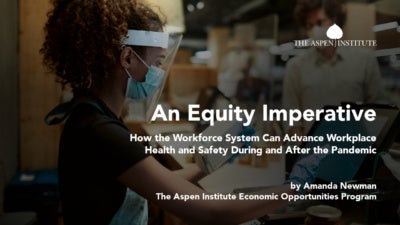
Advancing Equity, Health, and Safety in the Workplace
Every worker deserves a job with healthy and safe working conditions, but the global pandemic has highlighted that this is not the reality for many people. As businesses reopen, workers are making difficult choices between providing for their families and protecting their health. And these risks are not distributed equally. Black, Indigenous, and workers of color are more likely to both experience the health consequences of the virus and to be concentrated in jobs with greater exposure. A new brief by Senior Project Manager Amanda Newman, “An Equity Imperative: How the Workforce System Can Advance Workplace Health and Safety During and After the Pandemic,” highlights key ideas for how the workforce development system—and public and philanthropic funders who support it—can promote workplace health and safety during the pandemic. Click here to read more.
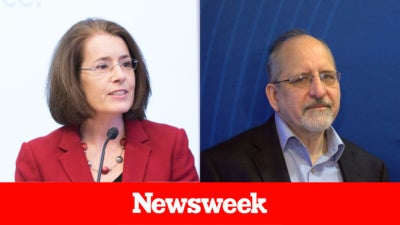
Buy American? Let’s Buy a Future for American Workers
Public procurement practices should be designed to encourage inclusive workplaces and good jobs. In an op-ed for Newsweek, Executive Director Maureen Conway and Good Companies/Good Jobs Initiative Director Mark Popovich describe how governments at all levels can leverage procurement dollars to promote high-quality employment opportunities. Over four years, we’ve developed a platform to provide firms with objective assessments of job quality —Working Metrics—including retention/turnover rates, employment benefits, internal advancement, benefits, and demographic profile of the workforce. Business practices change when money talks. “Buy America” is already a no-brainer, so let’s use public funding to procure some of the best jobs that money can buy. Click here to read more.
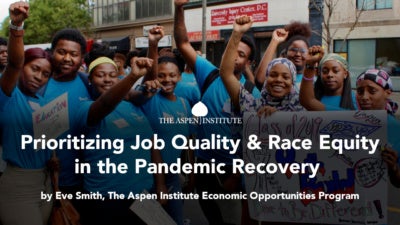
Prioritizing Job Quality & Race Equity in the Pandemic Recovery
As businesses work toward reopening safely, heightened public awareness of the devastating impacts of systemic racism, particularly for the Black community, has pushed employers to assess and adapt their own workplace practices. How can workforce development professionals seize this opportunity to engage businesses in conversations about job quality and race equity? In a new blog post, “Prioritizing Job Quality & Race Equity in the Pandemic Recovery,” Research Intern Eve Smith describes how organizations can advance job quality and center race equity in their work, based on the experience and example of YouthBuild Philly. Her insights are drawn from a recent discussion that featured EOP’s Senior Project Manager Jenny Weissbourd in conversation with Clair Minson of the New Orleans Business Alliance, and Robin Walker and Zuri Stone of YouthBuild Philly. Click here to read more and watch the discussion.

Walmart Opening Pathways to Skilled Trades Careers
While a path to an affordable four-year college degree should be available to everyone, it’s not the path that everyone will or should choose. That is why we were pleased when Walmart recently expanded their Live Better U education benefit program to include six skilled trades programs, with plans to link participating employees to related employment opportunities within the company. In a new blog post, UpSkill America Director Jaime Fall and EOP Research Director Amy Blair discuss the Importance of this program enhancement that incorporates work-based learning into skills trades training programs. We also compiled a handy infographic detailing how this program works from enrollment to completion. Click here to read the blog post and click here to view the infographic.
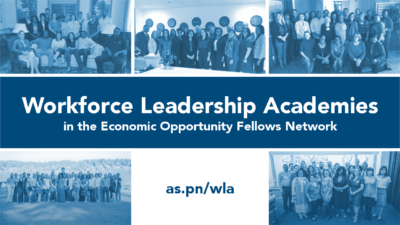
Updates from the Workforce Leadership Academies
Workforce Leadership Academy Fellows in Jackson, Mississippi, met for the first time this month in an online orientation session, which included remarks from Mayor Chokwe A. Lumumba and Chief Administrative Officer Dr. Robert Blaine about the value of the Academy and the importance of the Fellows’ leadership in helping to realize the city’s vision of an inclusive economy that works for all in Jackson. Fellows and alumni of the Workforce Leadership Academy also convened this month for a critical conversation about the state of racial equity in workforce development. Sparked by a recent article written by Clair Minson (Assistant Vice President, Talent Development, New Orleans Business Alliance, and Baltimore Workforce Leadership Academy alumna), participants explored the intersections of the workforce development field and the country’s reckoning with racial justice and equality.

Expiration of Unemployment Benefits Puts Millions of Workers at Risk
Executive Director Maureen Conway was quoted in the Ohio Capital Journal on the expiration of supplemental unemployment benefits passed as part of the federal CARES Act. “With nearly 32 million people receiving unemployment benefits, this is a huge, huge problem for so many families. And we know that the people who lost employment disproportionately are lower-wage workers with not very much to fall back on.” Conway notes that many of those who are unemployed are unable to find work for a variety of reasons, including insufficient access to childcare, lack of transportation, and ongoing concerns for the health and safety of loved ones. Even among those who are unemployed, many in low-wage occupations don’t earn a living wage without public support. “The truth is that work has not been enough to support a very large proportion of working families.” Click here to read more.

Why Can’t Entrepreneurs of Color Access Stimulus Funds?
Business Ownership Initiative Director Joyce Klein spoke with Kinsey Grant on Morning Brew’s Business Casual podcast to discuss why businesses owned by entrepreneurs of color have had difficulty accessing stimulus funds provided through the federal government’s Paycheck Protection Program (PPP). The conversation builds on a blog post published earlier this year, in which we called on policy makers to support community development financial institutions as a key channel for getting relief funds to businesses owned by people of color. And we will continue this vital discussion at our event this Tuesday, August 4, “Delivering Credit to Entrepreneurs of Color Impacted by COVID-19: Why Community Financial Institutions Are Essential.” Click here to listen to the podcast.

Jaime Fall Talks Upskilling at HBCU Philanthropy Symposium
UpSkill America Director Jaime Fall was a featured speaker during the opening session of the 10th annual HBCU Philanthropy Symposium, which was held virtually on July 22. Jaime participated in a fireside chat with Daryl Graham, senior vice president of philanthropy at Strada Education Network, to discuss UpSkill America’s employer engagement work in partnership with Strada Education Network. The work has studied employer engagement activities of philanthropy and nonprofit organizations from across the country, as well as partnerships employers and education institutions have formed to ensure education programs equip graduates with the skills required for success in the workplace.

Jenny Weissbourd Talks Job Quality at Reenvisioning Retail Conference
What is a good job and how do we define job quality? On July 24, EOP Senior Project Manager Jenny Weissbourd participated in a panel discussion at the Colorado Workforce Development Council’s Reenvisioning Retail conference. In a conversation facilitated by the CWDC’s Renise Walker, Weissbourd shared her insights on why job quality matters for workers and employers, especially during our current crisis. She pointed to practical tools and approaches that practitioners can put to work immediately to prioritize job quality during the crisis, including EOP’s new Job Quality Tools Library. She was joined alongside independent consultant Jennifer Briggs and the Good Jobs Institute’s Sarah Kalloch, who is also an Aspen Job Quality Fellow. Click here to learn more about the conference.
Upcoming Events
EOP will continue to host virtual events and webinars this summer. Join our mailing list and follow us on social media to learn when new opportunities are available.
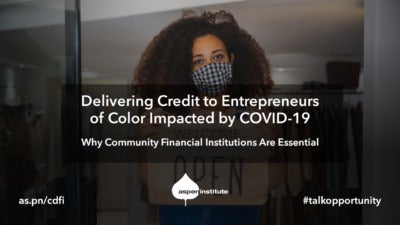
August 4: Delivering Credit to Entrepreneurs of Color Impacted by COVID-19: Why Community Financial Institutions Are Essential
Small businesses have endured some of the hardest stresses of the pandemic, especially those owned by entrepreneurs of color. Funding opportunities that flow through banks often miss communities that have historically been underserved. Community Development Financial Institutions (CDFIs) serve the parts of America that too often get left behind. What role can CDFIs play in supporting entrepreneurs and advancing equity during this uncertain time? And how can policymakers, investors, philanthropy, and others support the work of CDFIs? Join us on Tuesday, August 4, at 2 p.m. ET, for our next event, “Delivering Credit to Entrepreneurs of Color Impacted by COVID-19: Why Community Financial Institutions Are Essential.” This discussion will feature Bill Bynum (Hope Credit Union), Michael Barr (Gerald R. Ford School of Public Policy), Nicole Jordan-Reed (Nicole Jordan Catering, LLC), and Helaine Olen (Opinion Writer, The Washington Post). Click here to register.
Upcoming: Job Quality in Practice Webinar – Advancing Equity, Health, and Safety in the Workplace
As part of our Job Quality in Practice series, EOP will be hosting a webinar exploring how the workforce system can advance workplace health and safety during and after the COVID-19 pandemic. The event will feature workforce development practitioners employing a variety of strategies to strengthen workplace health and safety, including elevating worker voice, engaging directly with employers, and partnering with local organizations to influence policy. Please join our mailing list to receive updates about the event and to RSVP.
Join the conversation
Follow EOP on social media to join the conversation!
Tweet What’s new at EOP? Learn how the @AspenInstitute Economic Opportunities Program is helping people connect to and thrive in a changing economy.
About EOP
The Economic Opportunities Program (EOP) advances strategies, policies, and ideas to help low- and moderate-income people thrive in a changing economy. We recognize that race, gender, and place intersect with and intensify the challenge of economic inequality and we address these dynamics by advancing an inclusive vision of economic justice. For over 25 years, EOP has focused on expanding individuals’ opportunities to connect to quality work, start businesses, and build economic stability that provides the freedom to pursue opportunity. For more information, visit as.pn/eop.
EOP has several initiatives, including the Business Ownership Initiative, Workforce Strategies Initiative, UpSkill America, and Good Companies/Good Jobs. In addition, across these approaches EOP hosts the Economic Opportunity Fellows Network and the Opportunity in America event series.
The Aspen Institute is a global nonprofit organization committed to realizing a free, just, and equitable society. Founded in 1949, the Institute drives change through dialogue, leadership, and action to help solve the most important challenges facing the United States and the world. Headquartered in Washington, DC, the Institute has a campus in Aspen, Colorado, and an international network of partners. For more information, visit aspeninstitute.org.
Thank you to our many partners and funders for supporting our efforts.
Support Our Work
We are committed to making our events and publications freely available to everyone who finds them useful. But if you find value in our work and are able to support it, please consider making a tax-deductible donation. Click here to learn more.
Keep in Touch
Click here to join our mailing list or sign up below. For updates every day, follow us on social media.


